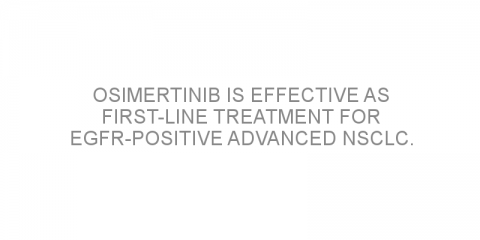In a nutshell This study is searching for participants with advanced solid tumors including lung cancer to examine the safety and effectiveness of experimental drug avapritinib (AYVAKIT). The main outcomes to be measured are the response to treatment and side effects. This trial is being conducted in Texas, US. The details Some cancers grow as a...
Read MoreLung cancer Posts on Medivizor
Should durvalumab be considered a first-line treatment for extensive small cell lung cancer?
In a nutshell This study looked at the effectiveness of durvalumab (Imfinzi) with or without tremelimumab plus platinum-etoposide (Etopophos) (PE) versus PE-alone for the treatment of extensive-stage small-cell lung cancer (ESCLC). The authors found that durvalumab plus PE showed sustain survival improvement in these patients. Some background...
Read MoreEvaluating the outcomes of prophylactic cranial irradiation for the treatment of non-small cell lung cancer with a high-risk of developing brain metastases
In a nutshell This study investigated the effectiveness and outcomes of using prophylactic cranial irradiation (PCI) in patients with non-small cell lung cancer (NSCLC) with a high risk for developing brain metastases (BM). The data showed that PCI significantly decreased the risk of developing BM and increased the overall survival in these...
Read MoreIs C-reactive protein associated with survival in patients with non-small cell lung cancer treated with atezolizumab?
In a nutshell This study was carried out to see whether a reduction in inflammatory marker C-reactive protein (CRP) following treatment with atezolizumab (Tecentriq) is associated with an improved survival in patients with non-small cell lung cancer (NSCLC). The authors found that a lower CRP following treatment was associated with improved...
Read MoreOsimertinib is effective as first-line treatment for EGFR-positive advanced NSCLC.
In a nutshell This trial was carried out to compare osimertinib (Tagrisso) with other EGFR inhibitors to examine its effectiveness in treating advanced non-small cell lung cancer (NSCLC). The authors found that this treatment was effective in increasing survival without cancer worsening in these patients. Some background NSCLC is...
Read MoreCan stereotactic body radiotherapy can be used as an alternative to minimal invasive surgery for early-stage non-small cell lung cancer?
In a nutshell This article compared the use of video-assisted thoracoscopic lobectomy (VATL) versus stereotactic body radiotherapy (SBRT) for the treatment of early-stage non-small cell lung cancer (NSCLC). The authors found that SBRT could provide an alternative treatment option for these patients. Some background Early-stage NSCLC is...
Read MoreDo single or combined immune checkpoint inhibitors improve outcomes in patients with advanced non-small cell lung cancer?
In a nutshell This article looked at the effectiveness and safety of first-line immune checkpoint inhibitors (ICIs) alone or as a combination compared to platinum-based chemotherapy (PBC) for advanced non-small cell lung cancer (NSCLC). The authors found that ICI therapy may improve the survival of these patients while having reduced side...
Read MoreShould ipilimumab and nivolumab treatment be considered before surgery in operable non-small cell lung cancer?
In a nutshell This trial was carried out to look at the effectiveness of nivolumab (Opdivo) and nivolumab plus ipilimumab (Yervoy) as neoadjuvant therapy (NAT; treatment before surgery) in treating operable non-small cell lung cancer (NSCLC). The authors found that ipilimumab and nivolumab treatment before surgery provides better...
Read MoreShould immunotherapy and radiotherapy be considered as an effective treatment for non-small cell lung cancer?
In a nutshell This article analyzed the safety and effectiveness of an immunotherapy (IT) and radiotherapy (RT) combination to treat patients with non-small cell lung cancer (NSCLC). The authors found that combination therapy using an immunotherapy drug such as PD-1/PD-L1 inhibitors and RT may improve the outcomes of these patients. Some background...
Read MoreIs olmutinib effective in treating T790M-positive unresponsive non-small cell lung cancer?
In a nutshell This article looked at the use of olmutinib (Olita) in the treatment of T790M-positive non-small cell lung cancer (NSCLC) that was previously unresponsive to a tyrosine kinase inhibitor (TKI). The authors concluded that olmutinib had clinical activity and manageable side effects in these patients. Some background NSCLC accounts for...
Read MoreHow does durvalumab impact the treatment of unresectable stage III non-small cell lung cancer based on previous treatment?
In a nutshell This study looked at the outcomes of durvalumab (Imfinzi) in patients with unresectable (cannot be surgically removed) stage 3 non-small cell lung cancer (NSCLC) who received different combinations of chemoradiotherapy (CRT) previously. The authors found that the use of durvalumab improved survival in all patients previously treated...
Read MoreSearching for patients with extensive-stage small cell lung cancer to trial a combination treatment.
In a nutshell This trial is looking to trial a treatment combination of olaparib (Lynparza), durvalumab (Imfinzi), radiation therapy (RT), and chemotherapy (CT) to treat patients with extensive-stage (ES) small-cell lung cancer (SCLC). The main outcomes to be measured are side effects and survival. This trial is being carried out in Texas,...
Read More














